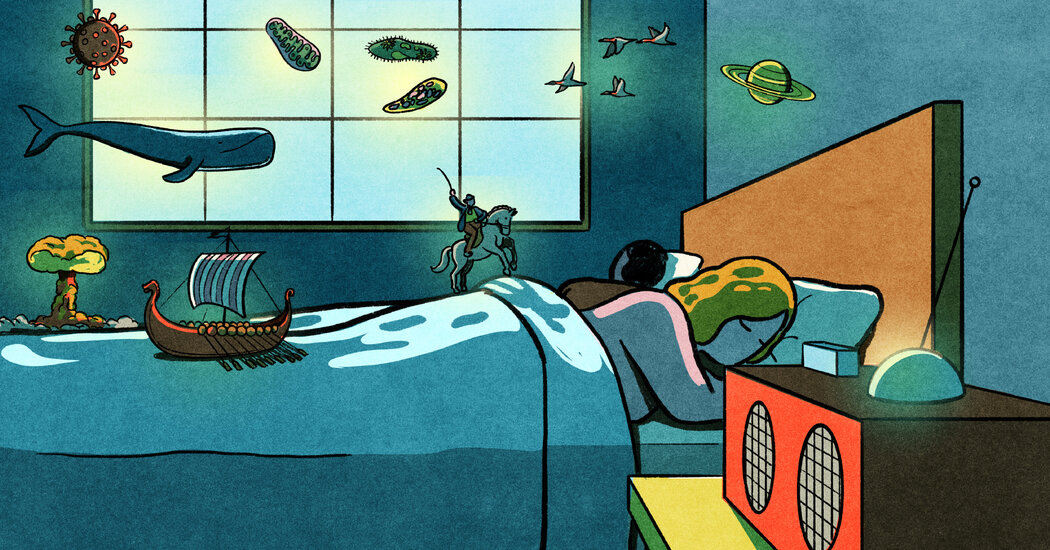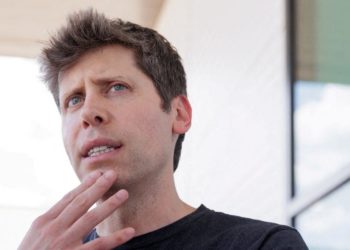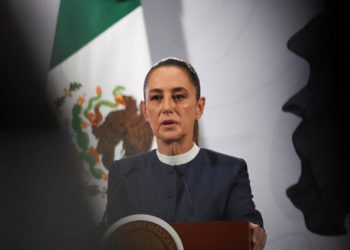It started with sleep, or lack thereof. I was a new parent, living in a new city, working a new job — my first as a university professor — when I lost, as one loses keys or the name of a minor actor, the ability to sleep. I tried hot tea and listing the presidents in chronological order. I tried my grandmother’s cure: warm milk with a shot of whiskey. I tried listening to whale songs and podcasts filled with monotone, meandering stories that would put anyone (except me) to sleep.
Then I found a solution that had been before me all along: academics talking.
The BBC’s “In Our Time” began in 1998 as a Radio 4 program with low expectations: Scholars and experts would discuss, but not debate, a new topic each Thursday at 9 a.m. Within five years, it reportedly had 1.7 million weekly listeners. A quarter-century later, its podcast archive offers “more than a thousand episodes,” as the host, Melvyn Bragg, reminds me each time I queue up a new one.
What I found soothing — aside from British accents — was the show’s curated feel, with Bragg as an affable but exacting guide (or, as another critic put it, “like a man throwing a stick for a dog”), leading three academics through the history and context of the Icelandic Sagas one week, then echolocation or Dietrich Bonhoeffer the next.
Each episode opens with a quick “hello” from Bragg before he introduces the subject at hand — “Hello, if you’ve ever seen a mysterious white or yellow blob on your garden compost heap or a fallen tree in the local park, you have come across slime mold” — and ends with a similarly efficient nod at what’s to come: “Next week, we’ll be talking about the dawn of the Iron Age about three thousand years ago. Thank you very much for listening.”
After the radio show ends, the microphone remains on as the academics and Bragg chat about what they missed or forgot to say until a producer arrives to ask if anyone wants tea. Or coffee.
By then, though, I was usually fast asleep.
For months, I listened and slept. Slept and (maybe) listened. Like a cabinet of curiosities or a junk drawer, “In Our Time” offered subjects that interested me — the Epic of Gilgamesh, bird migration, Rosa Luxemburg — and those I never considered: megaliths, the Polish-Lithuanian Commonwealth, bacteriophages (“the most abundant life form on the planet,” Bragg says.)
Then one day, I woke up curious enough about a half-heard episode that I queued it up again on my run. I chose another for my walk with the dog. And just like that, “In Our Time,” and Bragg specifically, became a daytime companion as well.
Bragg is idiosyncratic in a way that often feels alchemistic. He stumbles when trying to pronounce “Gilgamesh,” then laughs at himself and moves on. He laughs again at his “ludicrous” request that a guest briefly summarize Immanuel Kant’s “Critique of Pure Reason,” but insists nonetheless. He questions and sometimes contradicts guests, then backs off — “You’re the scholars!” — and prods them to be more plain-spoken if they trend abstract: “Can you develop that a bit?” Bragg is businesslike, staid at times, but also stumbles into outright delight, as he does in a favorite episode on the inner workings of mitochondria.
“And this is happening to all four of us now as you speak?” he asks a guest, Nick Lane, at one point.
“Absolutely, and everybody in the whole world,” Lane says.
“It’s extraordinary, isn’t it?” Bragg sounds genuinely astounded; then he’s off to his next question.
He’s not perfect. To my ear, Bragg interrupts the female academics more often than the men, especially in earlier episodes, and he sometimes rushes past biographical tangents I consider vital (Did a family of sea otters really lick Saint Cuthbert dry?), but in most episodes he balances enthusiasm for the subject at hand with a superhuman ability to elicit succinct explanations of that subject from his guests.
Over years of listening, I’ve tracked his evolving interests (astrophysics seems to be on the rise) and a perceptible aging of his voice (he’s 85). Then, in September, I heard a new voice, jarring in its youth and cheer, bringing us the news that after 27 years as host, Bragg had decided to step down.
“Who will put me to sleep now!?!??” my little brother, a fellow proselyte, texted when he heard.
In eulogies for the show under Bragg’s direction, most writers have talked about the civility he brought to the airwaves, his skill at crafting a show both highbrow and popular, intellectual and binge-able. A lesser-noted feat, one I am only recognizing now, is how effectively “In Our Time” makes the case for academics.
I’m mostly an interloper in this world, a journalist who went to graduate school late, a writer teaching for an English department, but I report quite a bit on the academy: on its failings and, more recently, the threats to its independence.
What happens on Bragg’s show, in the best episodes, is what I see happen in the academy in its best iterations. People who have dedicated their lives to studying one very specific thing share what is meaningful about that thing with others. In return, those of us listening experience the joy of learning something new and the awe (more than 1,000 episodes!) at realizing how much there still is to learn.
And sometimes, we also get a good night’s sleep.
Sarah Viren is a contributing writer for the magazine and an associate professor of creative writing at Arizona State University. Her most recent book is the memoir “To Name the Bigger Lie.”
The post The Soothing British Radio Show That Blew My Mind — and Put Me Right to Sleep appeared first on New York Times.




